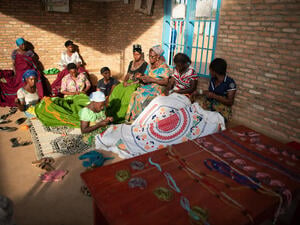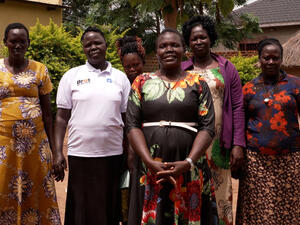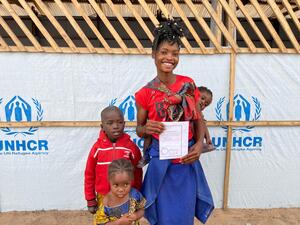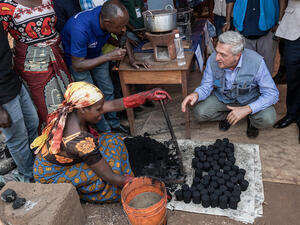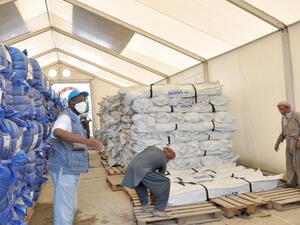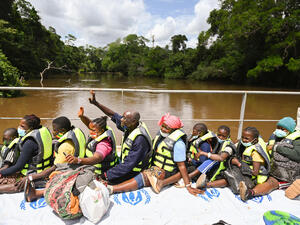Heading Home: First returns from quake zone in Pakistan
Heading Home: First returns from quake zone in Pakistan

Earthquake survivor Atta Ur-Rahman points to where his home used to be in Ganool village Balakot, Pakistan. Now, it is just rubble.
MANSERAH/BALAKOT, Pakistan, Mar 15 (UNHCR) - Atta Ur-Rahman, flanked by one of his daughters, walks to his tent pitched a few metres from where his elderly father, Wali, is sitting on a pile of rubble carefully cracking almonds with a brick. This rubble was once their family home in the village of Ganool. And, after spending four months in a temporary camp, this pile of broken bricks and stones is what Atta, his wife and their five children have come home to.
The Pakistani authorities have recently announced that the temporary camps for earthquake survivors like the Shohal Najaf camp where the Ur-Rahman family were staying will now close as the cold winter months draw to an end. UNHCR, which has been the lead agency for managing these camps, is working now to ensure that people are not forced to return, but are able to do so voluntarily. It's also trying to ensure that vulnerable people, such as those who are seriously disabled, widowed or have lost their land in landslides, are found somewhere else to live.
With 134 emergency staff in the field, UNHCR is currently supporting the Pakistani authorities in caring for more than 147,000 earthquake survivors. UNHCR field staff say their main concerns are the availability of land, repairing damaged roads, shelter, drinking water and food in the villages.
When the Ur-Rahman family left the camp, they took their tent, and were supplied with blankets, quilts, and a month's supply of food rations each. They are among over 130 families to have made the journey home in recent days. Their main task now is to rebuild their house. But like many people, part of their land was lost in the destructive landslides that followed the quake.
"It'll be difficult to reconstruct because of the condition of the land, but we can build one room," says Wali.
Atta says over the next few months he hopes to raise the money they need to do this. "I'm a driver, I will work more and make money." They already have some supplies. "We have the wood and bricks from the rubble, and thirty-five corrugated galvanized iron sheets for building our home," he said.
His five-year-old daughter, Farad, was pinned under this rubble for almost three hours on the day of the quake until villagers rescued her. Today, she coyly watches as her father and grandfather survey the work which lies ahead of them.
Wali Ur-Rahman remained in their home village throughout the winter along with ten other members of their family. Atta's brother was killed in the disaster and Wali stayed and looked after his widowed daughter-in-law, as well as their cattle.
"We had four cows before the quake, after it we had only two. You can't take cows to a camp," he said.
The Ur-Rahman's world was turned upside down by the earthquake - a once proud existence within the intimacy of the mountains was reduced to piles of rubble. But there are signs of healing. Asked why he chose to remain in his village following the quake and not join his son, daughter-in-law and grandchildren who sought shelter in Shohal Najaf Khan camp, he says with an irrepressible spirit: "There is no place like home."
By Fatma Bassiouni in Balakot and Manserah, Pakistan


